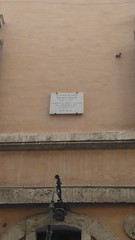Commemorated on 1 plaque
Il poeta tedesco Thomas Mann 1875-1955 e vissuto in questo palazzo dal Novembre 1896 al Luglio 1897
English translation: The German poet Thomas Mann 1875-1955 lived in this house from November 1896 to July 1897
, Rome, Italy where they stayed (1896-1897)

